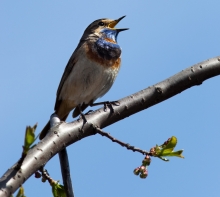In humans, the dopamine system has been tied to rewards and pleasurable sensations. As well as to memory and learning. A recent study from McGill University, published in Current Biology, suggests that dopamine may also play a key role in shaping what songs female songbirds enjoy, which may ultimately affect mating as females choose (and then remember) their mates based on the songs they prefer.


Do songbirds and humans have common biological hardwiring that shapes how they produce and perceive sounds?
Scientists who study birdsong have been intrigued for some time by the possibility that human speech and music may be rooted in biological processes shared across a variety of animals. Now, research by McGill University biologists provides new evidence to support this idea.

McGill Newsroom
The research has implications for understanding human developmental disorders such as autism
Adult songbirds modify their vocalizations when singing to juveniles in the same way that humans alter their speech when talking to babies. The resulting brain activity in young birds could shed light on speech learning and certain developmental disorders in humans, according to a study by McGill University researchers.

